Here are 10 things you should know about Annette Hanshaw, born 122 years ago today. For our money, she was the gold standard for songbirds of the late 1920s and early ’30s. We’ll be featuring her recordings on Cladrite Radio all day, so tune in now!
Tag: Annette Hanshaw
Remembering Rose Marie: 90 Years a Trouper
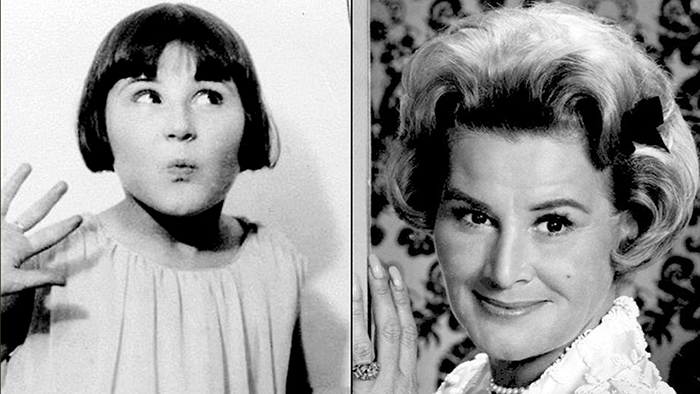
Few entertainers in history enjoyed as long a career as did Rose Marie, born 100 years ago today. Her career began when she was just four years old (known then as Baby Rose Marie, she had a weekly radio program that was broadcast nationally before Shirley Temple was even born), and she went on to enjoy success in vaudeville, radio, records, motion pictures, Broadway, and television.
In 2017, a delightful documentary, Wait for Your Laugh, was released that told the story of her amazing life and career, and we’re delighted to share a very lightly edited transcript of a telephone conversation we had with her shortly after the film’s release. Buckle your seat belts; it’s a delightfully wild ride. As you’ll soon see, even at 94, Rose Marie was as sharp and as funny as ever.
Cladrite Radio: I have a lot of things I’d like to talk to you about.
Rose Marie: First of all, let me ask you a question.
Cladrite Radio: Sure.
Rose Marie: Did you see the movie [Wait for Your Laugh]?
Cladrite Radio: I did!
Rose Marie: What’d you think of it?
Cladrite Radio: I loved it. I thought it was great.
Rose Marie: What’d you like about it?
Cladrite Radio: I’m very interested in the popular culture of the 1920s, ‘30s and ‘40s, in addition to …
Rose Marie: That’s my era.
Cladrite Radio: It sure is. I am involved with an online radio station that features music of that era. We play some of your records on the station.
Rose Marie: Oh, nice.
Cladrite Radio: When I got the chance to interview you, I was so excited. I’m a fan of your music, and I grew up with you on TV as well.
Rose Marie: I know, everybody says that. It makes me feel so old.
Cladrite Radio: Oh, well, I’m not so young myself.
Rose Marie: I’m 94, wanna bet?
Cladrite Radio: You’re doing great. You’re probably doing better at 94 than I am at 59.
Rose Marie: Okay.
Cladrite Radio: I wanted to ask you about the documentary. Whose idea…
Rose Marie: I’m very happy to tell you. I’m very proud of it. I love it. I’m so proud of [director] Jason Wise, I can’t stand it. I think he’s a genius. I think he’s going to be one of the biggest men in the business in a couple years. I think this will introduce him to everybody. I think he’ll even be bigger than Steven Spielberg.
Cladrite Radio: I’ll bet he wouldn’t mind that a bit.
Rose Marie: Oh, he’s wonderful. You have no idea. You don’t know how particular he is. When we decided to do this thing, I kept everything from the time I was three years old. Postcards, pictures, film, anything I had, I kept. When he talked about doing the documentary, he says, “Let’s talk.” I said, “I have everything in scrapbooks. Why don’t you just go through everything?” I emptied out my house, and I mean he cleaned me out of everything. He put it in that documentary. Just a genius.
Cladrite Radio: All the materials that we see in the documentary, the film clips we see and some of the programs and promotional materials and various things that are included in it…
Rose Marie: All mine. All mine that he dug up out of my house.
Read More »
Remembering Annette Hanshaw on Her Birthday
Cladrite sweetheart Annette Hanshaw was born 120 years ago today in Manhattan. For us, she’s the gold standard for songbirds of the late 1920s and early ’30s; we think she’s keen. She retired after only a few years—the spotlight didn’t suit her—but what a legacy she left. We’ll featuring her music all day today on Cladrite Radio, so why not tune in now?
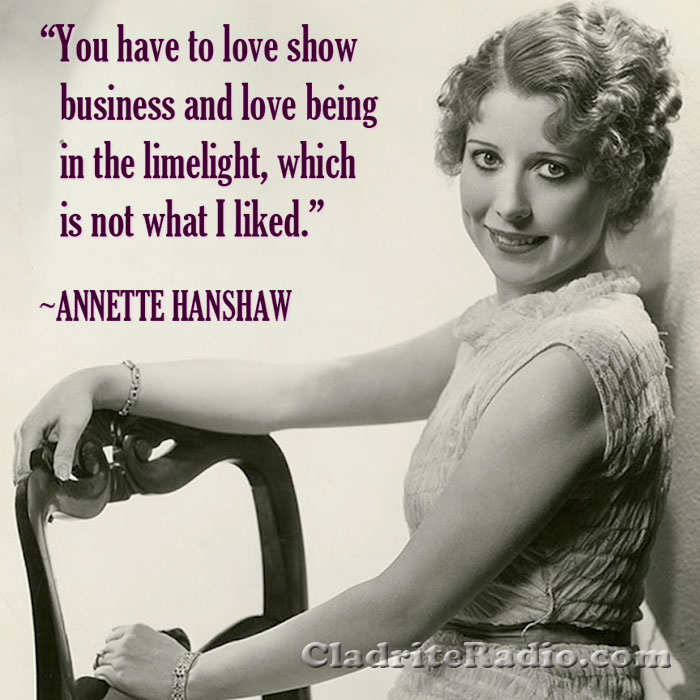
Moonlight Saving Time for Us, Please!
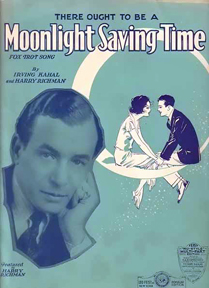 We’re awfully fond of the Harry Richman–Irving Kahal tune, (There Oughta Be a) Moonlight Saving Time, and we invariably think of it on this day every spring.
We’re awfully fond of the Harry Richman–Irving Kahal tune, (There Oughta Be a) Moonlight Saving Time, and we invariably think of it on this day every spring.
It was recorded by a wide variety of artists and orchestras when it debuted back in 1931, from Ambrose and His Mayfair Hotel Orchestra to Maurice Chevalier, Guy Lombardo and His Royal Canadians, and Jay Wilbur’s Hottentots, but our favorite rendition, in large part because she sings the verses as well as the chorus (unlike most of the other artists who have recorded, back then and in the years since) is by Cladrite Radio sweetheart Annette Hanshaw, who recorded the song in New York City on May 9, 1931, accompanied by Jimmy Dorsey on clarinet, Sammy Prager on piano and Eddie Lang on guitar.
Our gal Annette’s performance of the song manages to be simultaneously playful, sincere and just a little bit saucy, which shouldn’t be surprising. She was a terrific singer, and it’s a catchy and clever song. Enjoy!
(There Oughta Be a) Moonlight Savings Time
Birdies fly with new ambition,
Spring is in their song.
Soon you’ll find yourself a-wishin’
Days were not so long.
If my thought is not defined,
Listen while I speak my mind:There oughta be a moonlight saving time
So I could love that boy o’ mine
Until the birdies wake and chime ‘Good morning!’There oughta be a law in clover time
To keep that moon out overtime,
To keep each lover’s lane in rhyme till dawning.You’d better hurry up, hurry up
Hurry up, get busy today.
You’d better croon a tune, croon a tune
To the man up in the moon,
And here’s what I’d say:There oughta be a moonlight saving time
So I could love that boy of mine
Until the birdies wake and chime ‘Good morning!’In January, the nights are very long
But that’s all right.
In happy June comes the honeymoon time;
Days are longer than the nights.In lovetime season, the moon’s the reason
For every cuddle and kiss.
When days are longer, the nights are shorter.
Something should be done about this.Oh, there oughta be a moonlight saving time
To make the morning glories climb
An hour later on the vine each morning.You sorta need a moon to bill and coo,
An old back porch, a birch canoe.
A parlor lamp in June won’t do, I’m warning.I’ve heard the farmer say, ‘I’ll make hay
While the sun is shining above.’
But when the day is done, night’s begun;
You can ask the farmer’s son, it’s time to make love.There oughta be a moonlight saving time
So I could love that boy of mine
Until the birdies wake and chime ‘Good morning!’
Words by Irving Kahal; music by Harry Richman—1931
Happy 113th Birthday, Annette Hanshaw!
Today marks the 113th anniversary of the birth of Cladrite Sweetheart Annette Hanshaw, so we thought we’d celebrate by revisiting this post, which originally appeared on January 14, 2010.
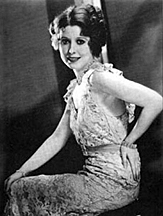 Annette Hanshaw, one of the most revered performers in the Cladrite Radio pantheon, was a very busy gal for a few years in the late 1920s and early ’30s. She recorded dozens of memorably jazzy pop sides (or were they poppy jazz?) between 1926 and 1934, under a variety of names and for several record labels (as was so often the norm in those days), and made innumerable radio appearances between 1932 and 1935. In fact, the readers of Radioland magazine voted Hanshaw, known in those days as “The Personality Girl,” their favorite singer of 1935.
Annette Hanshaw, one of the most revered performers in the Cladrite Radio pantheon, was a very busy gal for a few years in the late 1920s and early ’30s. She recorded dozens of memorably jazzy pop sides (or were they poppy jazz?) between 1926 and 1934, under a variety of names and for several record labels (as was so often the norm in those days), and made innumerable radio appearances between 1932 and 1935. In fact, the readers of Radioland magazine voted Hanshaw, known in those days as “The Personality Girl,” their favorite singer of 1935.
Tommy Dorsey himself once called Hanshaw “a musician’s singer.”
So it was a huge loss to the world of pop and jazz music when Hanshaw retired from show business after marrying Pathé Records executive Herman “Wally” Rose. She made her last record in 1934 and appeared on the radio for the final time in 1937.
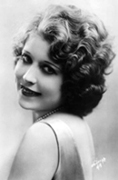 In recent years, much of Hanshaw’s recorded output has made its way to CD, boosting her current popularity and keeping her in the public eye. Her songs are even featured prominently in director Nina Paley’s 2009 animated film Sita Sings the Blues.
In recent years, much of Hanshaw’s recorded output has made its way to CD, boosting her current popularity and keeping her in the public eye. Her songs are even featured prominently in director Nina Paley’s 2009 animated film Sita Sings the Blues.
Though a rumored pair of mysterious demo records, cut many years after her retirement when Hanshaw was said to be considering a comeback, have never been released to the public, some “homemade” recordings Hanshaw did surface on YouTube.
The person who posted the recordings offered the following background:
These two selections are the best sounding of a batch of homemade recordings that Annette Hanshaw did. Her husband copied them onto a tape for a friend of mine. I don’t know when they were made but on one of the records she refers to “Steve Cochran’s looks”. He was a big movie star for a couple of years around 1950. So that’s a hint. Unfortunately the sound on the others is pretty bad.
For Hanshaw fans, these recordings, even lacking as they admittedly are in fidelity and clarity, are an unexpected and delightful gift. They make us wish our Annette had mustered her courage and taken the plunge on that 1950s comeback. And for those who have somehow not been yet exposed to Hanshaw’s delightful stylings of the 1920s and ’30s, just keep listening to Cladrite Radio. You’ll quickly become very familiar with her work.
